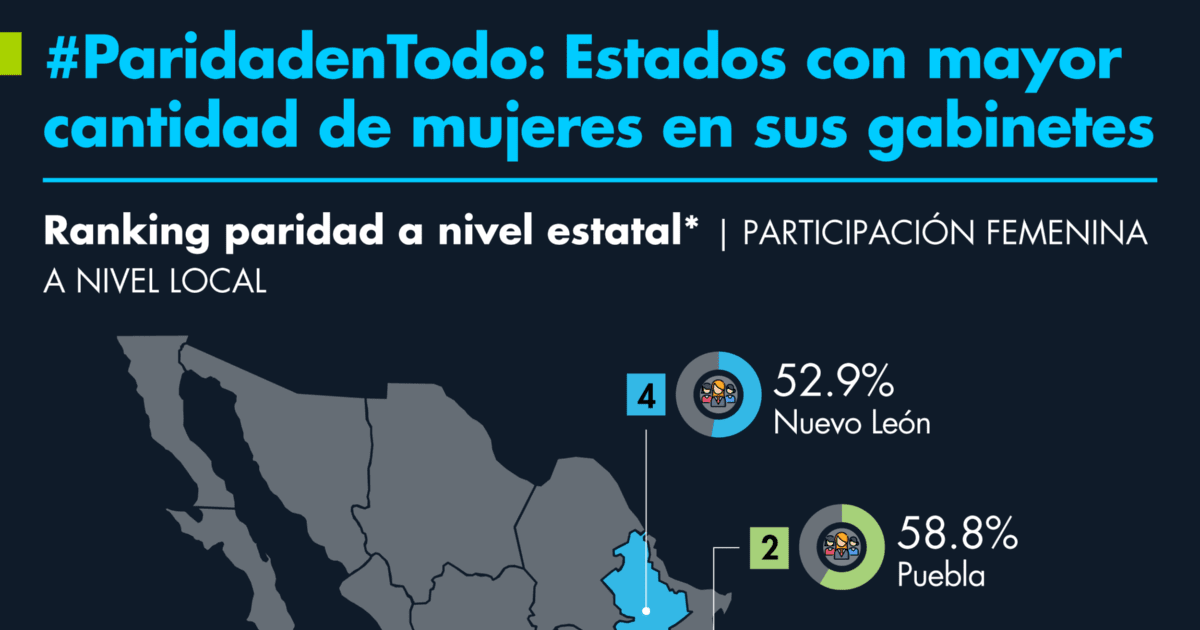Three years after the reform “parity in everything”, Women continue to be underrepresented in the Executive at the federal and state levels, says a Senate report. But among them, Afro-Mexican women have been denied more spaces: “It is almost unthinkable that we will even occupy a leadership position,” says Rosa María Castro, president of the Association of Women of the Oaxaca Coast (AMCO).
In the federal Executive, eight of 20 dependencies are led by women, so they represent 40 percent. But at the state level, of more than 524 secretariats and agencies, only 46 have a woman as head, which represents 8.8%, indicated in the report Gender parity in the secretariats and dependencies of the Executive at the federal and local levels carried out by the Belisario Dominguez Institute of the Upper House.
The investigation led by César Alejandro Giles Navarro also highlights that women are excluded of the organisms with greater political interference and with more budget. For example, there are only seven government secretaries at the local level.
“In addition to the breach of parity, simulation practices persist,” the document warns. For example, they place them in the dependencies with the lowest budget or linked to care work, such as health and education.
In this regard, Rosa María Castro details that “in the political imaginary and public administration, women, and mainly Afro-Mexican women, are not included. Patriarchy, machismo and structural racism continue to exclude us.”
Unfortunately, the Constitution or other law does not provide a mechanism for ensure parity nor sanctions for non-compliance, warns the note from the Senate.
How did the whole process start?
In 2019, Congress reformed nine articles of the Constitution to establish the obligation to apply gender parity in the integration of the three Powers of the Union and in the three levels of government.
The changes were approved in the LXIV Legislature, named the “parity legislature”as it was the first time that in the Chamber of Deputies women obtained almost half of the seats and in the Senate, the majority.
The amendment was enacted on June 6, 2019 and introduced parity in the cabinets as a progressive fact, so it must materialize depending on the change of the different authorities. However, of the 15 entities that renewed their government in 2021, only three comply with a joint central administration.
In the 19th and 20th centuries, women in Mexico fought for the right to vote and be elected to public office. Once they got it, it didn’t mean they could exercise it easily.
To guarantee their effective access, Congress established gender quotas mandatory for political parties. For this reform, the Legislature ordered parity for all positions of popular election.
But “with regard to Afro-Mexican or indigenous women from the coast, that possibility is still limited. If we don’t belong to the leadership of a partyin the case of those of us who are located in municipalities governed by that system, it is simply impossible to obtain a candidacy”, explains Rosa María Castro.
The activist for the rights of women and the Afro-Mexican population sought to be a candidate for a local deputation. She in the end she was not chosen, despite the fact that there is the principle of parity and the representation fee for indigenous and Afro-Mexican peoples.
How are we going to three years?
Of the 32 entities in the country, only six meet parity in their cabinets, in five of them there are even more women than men at the helm. Colima It is in the lead, since 63% of its central public administration is directed by women.
The second of those states is Puebla, with 58 percent. In Chiapas and in oaxaca 56% of state ministries and institutions are led by women. Finally, New Lion Y Warriorwith 52% and 50%, respectively.
However, Rosa María Castro insists: “There are more and more women occupying important spaces, but very few are indigenous women and much less, Afro-Mexican women”. More than 1.2 million Afro-descendant women live in Mexico in the 32 entities, according to the 2020 Population Census, “there is no excuse,” says the activist.
In Mexico City, although it is close to parity, there are fewer women in the secretariats and central agencies, they occupy 47.4% of the positions. The five entities with the least progress are Aguascalientes (12.9%), Durango (14.3%), Guanajuato (15.4%), Gentleman (15%) and Tamaulipas (16.7%).
But the number of women holding high positions is not only relevant, but what kind of responsibilities are conferred on them. Most state governments entrust them with the secretariats of function Public or the Comptroller. That happens in 18 states.
Second, the tourism portfolio, there are 15 holders. And thirdly the cultural affairs, in 14 entities they are directed by women. State government programming, energy development and legal advice are the three positions least entrusted to female officials.
Meanwhile, at the level of state congressesIn 2022, for the first time, there are more women than men, reveals an investigation carried out by the Mexican Institute for Competitiveness (Imco). Of 1,063 elected congressmen, 566 were women, 496 men and one non-binary congressman. Of the 566 women, 323 (57%) were elected by the principle of relative majority (MR) and 255 (43%) by proportional representation (PR).
“The multi-member seats helped balance the parity in congresses. In nine states where parity was not achieved due to the relative majority principle, that is, the same number of men and women did not enter due to direct competition in electoral districts, women achieved balance parity in their congresses by entering in greater proportion by the principle of popular representation. This highlights the value of plurinominal deputations as a mechanism to allow access to women in local congresses, in addition to allowing a more balanced and plural representation”, highlighted the organization in a statement.
Once Congress passed the parity reform, “the absolute commitment to include political parties and state and municipal governments is required”, to monitor society and mechanisms that force them to comply with parity, says Rosa María Castro. Otherwise, no matter how many reforms are made, she concludes.

















